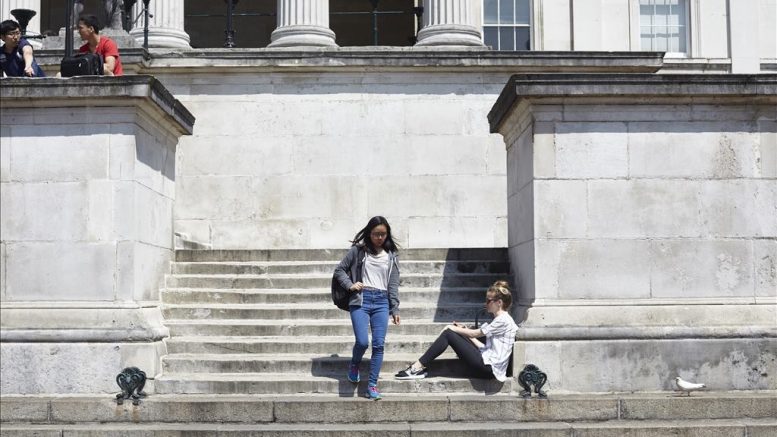An influential parliamentary committee will today warn Theresa May’s Government that it must offer university staff and students from the EU guaranteed futures in the UK if the sector is to survive Brexit, Aban Contractor writes.
The Government must address staffing, immigration, and research concerns to avoid a damaging Brexit for United Kingdom universities, a cross-party committee of MPs will say.
It needs to provide guarantees to university staff from the European Union and design a new immigration system that better meets the needs of higher education, the House of Commons Education Committee says in its report, Exiting the EU: challenges and opportunities for higher education.
The future residency rights of EU citizens currently living in the UK needed to be clarified and the committee called for uncertainty over staff from the EU to be reduced immediately.
The committee also urged the Government to remove overseas students from the net migration target, making it clear it wants talent from the EU and the rest of the world to come to the UK.
As large and complex organisations, universities plan for years down the line, so it’s important that we receive clarity of the Government’s positions on these crucial issues as soon as possible
Conservative MP Neil Carmichael, chair of the education committee, said higher education in the UK is a world leader but Brexit risked damaging the country’s international competitiveness and the long-term success of its universities.
“It’s welcome that EU students have been given some guarantees on their funding and loan access, but the Government must act urgently to address the uncertainty over EU staff and avert the risk of a damaging ‘brain drain’ of talent from our shores,” he said.
“As we leave the European Union we now have the opportunity to reform our immigration system to ensure we reap the full rewards of the ability of our universities to attract the brightest and best students and staff from across the world.”
University and College Union (UCU) general secretary Sally Hunt welcomed the report, saying she hoped the Government would now act to ensure that the sector is not damaged as the UK prepares to leave the EU.
“Along with international students, overseas staff make a huge contribution to UK society and I call on the Government to end their uncertainty or risk damaging the UK’s ability to attract staff and students from around the world,” she said.
“The select committee’s report referenced a recent Comres survey for UCU which found that just over three-quarters (76 per cent) of EU academics at UK universities said that, in light of the referendum result, they were now more likely to consider leaving UK higher education.”
Deputy chief executive of Universities UK Alistair Jarvis said the Government should seek to secure continued close collaboration with EU research partners and also provide certainty for EU staff currently working in UK universities in terms of work and residency rights.
“Changes to our immigration system are also needed to ensure that the UK remains a destination of choice for international talent and students,” he said.
“As large and complex organisations, universities plan for years down the line, so it’s important that we receive clarity of the Government’s positions on these crucial issues as soon as possible.”
The 51-page report recommends an open approach with few barriers as the best model for all international students, including those from the EU. The Committee calls for the UK to retain a reciprocal open approach with light touch controls, such as visa-free access, which would enable the preservation of a system closely resembling freedom of movement.
Not only financial – intl students make a vital academic & cultural contribution to the UK https://t.co/Q8hCHoIXQ0 pic.twitter.com/FR2F8cB4xR
— Universities UK (@UniversitiesUK) April 23, 2017
To support the sector and help rebalance the economy, the report calls for the Government to establish a new regional growth fund to replace, and exceed, the investment from European structural funding, and to ensure that all regions benefit from this domestic funding.
It recommends that the Government commit to Horizon 2020 and future research frameworks to ensure ongoing research collaboration with the EU, but calls on the Government to develop a plan to match this funding if there is a failure to access these programmes.
The report recognises the importance of the Erasmus+ programme for student and staff mobility and that the Government should target continued membership. However, if membership looks unlikely, the committee recommends developing a home-grown replacement which could include mobility beyond Europe.
Mr Carmichael said a future administration should develop a bold cross-Government strategy to take advantage of the global reach of UK universities and ensure that higher education plays an important role in upcoming trade deals with the rest of the world.
“If the next Government takes these steps, our university sector will be able to punch [above] its weight and seize the local and global opportunities on offer as we leave the European Union,” he said.





